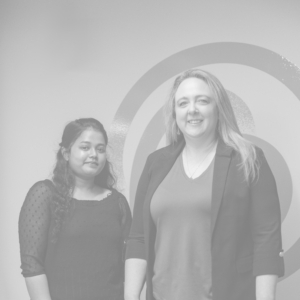From Rural Counties to the Inner City, Financial Education Makes an Impact

Program partnerships and integrated financial literacy education expand access to underserved populations across Alberta.
Financial education often strives for traditional outcomes like equipping people to better manage their personal finances. But it can also serve unexpected purposes — like acting as a powerful protection against elder abuse.
Gabrielle Kirk works with seniors in Vulcan County and when she encounters cases of elder abuse, it most often involves financial abuse.
“We see people who are either being pressured into giving power of attorney to someone whom they don’t really trust, or their existing power of attorney is misusing their finances,” says Kirk, director and case manager at the nonprofit organization Senior Protect.
While Kirk travels around the sprawling county to visit seniors, Senior Protect has identified a new opportunity to help more clients by having an elder abuse prevention worker based in the Town of Vulcan. What started as an idea for improved financial education access is becoming a reality thanks in part to an AIMCo Foundation community grant provided to program partner Rainbow Literacy and Learning Society.
The rural hamlets and villages surrounding the Town of Vulcan have a high proportion of residents over the age of 65. Many seniors regularly visit the Vulcan & Region Family and Community Support Services (FCSS) building, which hosts tax clinics, a food bank and other programming. This well-known and well-attended space is where the new elder abuse prevention worker will be based as part of a partnership between Senior Protect, FCSS and the Rainbow Literacy and Learning Society.
“I feel like there’s not always a lot of respect for seniors,” says Barbara Moore Coffey, the executive director of the Rainbow Literacy and Learning Society, when asked why she wanted to get involved in this project. “I see how wrong this kind of abuse is, and it irks me.”
Kirk has seen seniors who have been swindled out of tens of thousands of dollars, or others who have been convinced to send monthly cheques to friends or family who have no reason to take the money. While phone or internet scams get a lot of media attention, Kirk says most elder financial abuse is done by friends or relatives of the senior.
The elder abuse prevention worker will connect with seniors and families to share simple and effective safeguards that help prevent elder financial abuse. Some examples include establishing a trusted power of attorney, if appropriate, and limiting the use of cash or credit cards. The latter can be achieved by making sure that the senior’s funds are received via direct deposit and that payments are made through automatic withdrawals as often as possible.
The elder abuse prevention worker will also support seniors in accessing all the financial benefits that might be available to them, be it Old Age Security payments or the Guaranteed Income Supplement.
Weaving Financial Literacy Education into Critical Frontline Support Services
About 420 kilometres north of Vulcan, in Edmonton’s downtown core, Sophia Mejia works with another population for whom access to quality financial empowerment education can be difficult.
The Bissell Centre supports people with very low incomes as they move out of poverty. For people who are unhoused or living on social assistance, financial decisions can affect every part of their lives. Through grant funding from the AIMCo Foundation, frontline staff at the Bissell Centre are equipped to provide financial education, no matter what issue might bring a client through their doors.
“Financial education overlaps with lots of things,” says Mejia. She notes that a client might want to be assessed for Fetal Alcohol Syndrome, the results of which could affect their application for the Assured Income for the Severely Handicapped (AISH) benefit — a vital step for creating stability in some people’s lives. “You can’t get housing without an income,” says Mejia.
Applying for AISH is a long and time-consuming process that involves a lot of paperwork. Bissell support workers can help clients navigate that system, sometimes starting with the very basic step of ensuring that a client has proper identification.
Mejia notes that when case workers are familiar with different financial benefits and systems, they can help with many different issues. In one case, a client received a $35,000 payment through the “Cows and Plows” settlement, established to compensate First Nations for agriculture benefits that were promised in treaties but never paid out. Thanks in part to community funding from the AIMCo Foundation, Bissell Centre staff were equipped to help the client develop a plan for the money and accompanied the client to the bank to set up a Tax-Free Savings Account and purchase Guaranteed Investment Certificates.
“We do monthly check-ins with staff about successes and challenges, and I always get someone stating they helped someone with budgeting or other financially important elements like holding proper personal identification,” says Mejia. “Financial issues always pop up.”
***
With thoughtful, tailored programs and engaging initiatives for all ages, AIMCo Foundation community partners are ensuring financial empowerment services are accessible to those who need them most. The AIMCo Foundation is proud to have awarded more than $1.6 million to 27 community partners since inception in 2018. If you are or know someone who is empowering access to financial education in Alberta, keep an eye on our website for details on upcoming funding opportunities.
Learn more about our community grant recipients and browse our impact report, Empowering Access, to see all we accomplished together in 2024.
